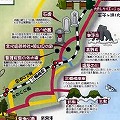Kii Peninsula is the most southern region of Honshu (the main island of
Japan). Moreover, its southern part is called Nanki or Southern Kishu District.
Nanki-Kumano, the title of this corner, is a general term of the Nanki District of Wakayama Prefecture with a part of Mie and Nara Prefecture.
This area being the important part of Yoshino-Kumano National Park was
registered as a World Heritage Site (Cultural Heritage) of UNESCO, as "Sacred
Sites and Pilgrimage Routes in the Kii Mountain Range," in July 2004.
"Nanki-Kumano" is, in detail, limited to such areas as south
of Tanabe City, west of Kumano City and up north to the places around Dorokyo
(Doro Gorge) and Kumano Hongu Grand Shrine.
Nanki-Kumano is blessed with wonderful places of natural beauty and historic
interest as well as famous shrines and temples. Also, Kumano-kodo Roads
connecting them remind us of our deep history, not to mention its scenic
beauty.
Miwasaki-ward of Shingu City, Wakayama Prefecture, is my hometown. I was
born and bred here until 19 years old when I. entered Hitotsubashi University
in Metropolitan Tokyo.
This small town is sandwiched between the sea and low mountains about the
size of a handkerchief. It faces "Kumanonada" or Kumano Open
Sea of the Pacific Ocean, and along the Ohechi Road of Kumano-kodo. Blessed
by the blue of the sea and the green of mountains, it is a beautiful town,
and several "waka" poems about the town were composed in "Manyoshu",
Japan's oldest anthology of poems.
 We call the mountain pass from this fishermen's town Miwasaki to the center of Shingu City along the sea of Kumanonada as "Koyanozaka" or Koyano Slope, which is the best scenic spot around this area and my first recommendation. We call the mountain pass from this fishermen's town Miwasaki to the center of Shingu City along the sea of Kumanonada as "Koyanozaka" or Koyano Slope, which is the best scenic spot around this area and my first recommendation.
|